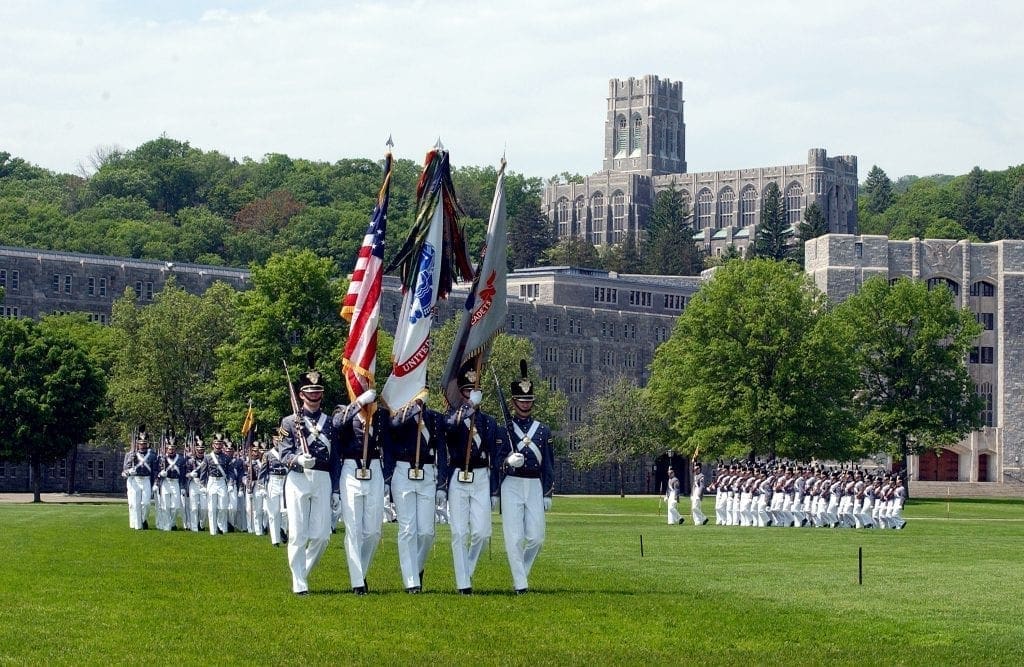
Cadet color guard on parade on the Plain, 2002 (USMA Public Affairs Office)
From the Playground to the Battleground: Dishonest Recruiting Tactics In School
With a rising need for troops, recruiters are going all out in recruitment. But, is it really fair?
Children may be at risk in school! With the recent passing of the No Child Left Behind Act, military recruitment officers have had their pockets full of names and phone numbers. The Act gives permission for recruiters to have personal information of all the students in school On top of that, these officers have been entering schools and trying to persuade students to join the ranks using unfair selling techniques and unscrupulous methods. Schools are places for learning, not a place for the military to harvest our future leaders with false promises and lies.
The No Child Left Behind Act (NCLB), which was passed in 2001 under the Bush administration, was designed to help schools with funding and to provide standardized testing. What was not mentioned is the military recruitment aspect of the Act. In short, it says recruitment officers are entitled to have any personal information the school has on its students. Recruitment officers can take and use this information without the child or parent’s permission, and they may use it to barrage households with mail and phone calls to try and get students to join the military. There are opt-out forms that can be completed and sent, which could help keep kids safe, but these forms are not sent to everyone and most people do not even
know that they exist.
Recruiters when looking for their “victims” tend to go to spots where teenagers hang out like malls, movie theaters, arcades, and of course high schools. Recruiters use selling manuals that contain lists of “how to” scenarios and what to say in certain cases. Manuals also give tips on following certain students and finding out things about them so a recruiter can have a starting point or something that will get the teen to
listen to what the recruiter has to say. An example is what is called a challenge close. One in particular reads, “You must be careful how you use this one. You must be on friendly terms with your prospect, or this may backfire. It works like this: When you find difficulty in closing, particularly when your prospect’s interest seems to be waning, challenge his ego by suggesting that basic training may be too difficult for him and he might not be able to pass it. Then, if he accepts your challenge, you will be a giant step closer to getting him to enlist.”
Not only do the recruiters focus on certain students, but they also focus on particular demographics. Children who live in areas with a higher poverty rate and those who live in lower-income households are targeted more than ones who live in wealthy neighborhoods. This is where tactics that talk about career opportunities and job training are used. However, in truth, veterans are 12 to 15 percent less likely to obtain jobs after their service, because the training the military gives is not always used in civilian life. Students don’t join the military because of patriotisrn; they do it because it’s all they have left.
Not only are these children targeted unfairly but there is fine print on the back of the enlistment contract that seems to be overlooked by almost all applicants. It reads: ”In the event of war, my enlistment in the Armed Forces continues until six (6) months after the war ends, unless my enlistment is ended sooner by the President of the United States. If I am a member of a Reserve Component of an armed force at the beginning of a period of war or national emergency declared by Congress, or if I become a member during that period, my military service may be extended without my consent until six (6) months after the end of that period of war. As a member of a Reserve Component, in time of war or national emergency declared by the Congress, I may be required to serve on active duty (other than for training) for the entire period of the war or emergency and for six (6) months after its end.” It’s funny that recruiters tend to forget to tell kids signing up about these ”extra” agreements they are making.
With a rising need for troops, it’s no wonder recruiters are using such techniques on these children. But is it really fair? Recruiters have defended their acts by saying they have freedom of speech and they are just there to show students more options. But why can’t that be done without phone call blitzes, obtaining personal information, and stalking students to see who they hang out with and what they do in their spare time? Cigarette companies are barred from marketing to children. Why isn’t the military? Both are potentially harmful to one’s health, aren’t they?
This article by Ken Farbam was digitized in accordance with the Eye’s archival policy. The original PDF is available here.

Chukwudi, better known as Chudy, has been Editor-in-Chief since his sophomore year and has worked on the newspaper since his freshman year. His main focus is editing of articles, social media, and managing the website.
